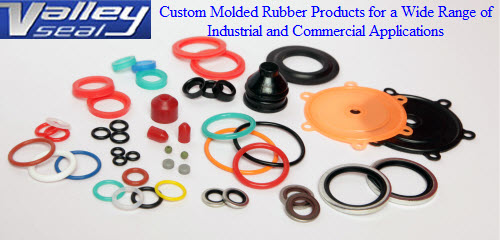Custom molded rubber products such as grommets, seals, bushings, bellows, boots, vibration mounts, gaskets, and washers are essential for a wide range of industrial and commercial applications. Produced mainly from compression, injection, and extrusion molding techniques, these rubber parts are available in several sizes, colors, and shapes.

What are these significant rubber products made from? Read on to know more.
The Commonly Used Types of Elastomers
Considering myriad applications in several challenging industrial environments, custom rubber products are manufactured to high quality levels using the finest range of elastomers. The following is a list of elastomers commonly used for producing custom molded rubber components.
- NITRILE (NBR) – This oil and flame resistant synthetic rubber is formed from a copolymer of acrylonitrile and butadiene. Low, medium, and high nitrile can be chosen based on the application requirements of customers. These compounds are known for their excellent resistance to abrasion, chemicals, oxidation, solvents, and fluctuating atmospheric conditions.
- THERBAN (HNBR) – Hydrogenated acrylonitrile butadiene (HBNR) can withstand elevated temperatures and aggressive industrial environments. Custom molded rubber components manufactured from HNBR are unaffected when in contact with oil and grease, various engine oils, and corrosive fluids. Due to all these superior attributes, the elastomer is chosen to produce rubber products that are meant for applications in refineries, chemical plants, and marine environments.
- FLUOROCARBON (FPM) – This elastomer features outstanding resistance to high temperatures and petroleum products. These superior attributes make this material a reliable raw material in the manufacture of molded rubber products. Low compression set in elevated temperatures also add to their popularity.
- NEOPRENE (CR) – Produced by the process of polymerization of chloroprene, this synthetic rubber is widely chosen for its excellent tensile strength and exceptional resilience properties. It possesses unmatched physical properties including, outstanding abrasion resistance, adhesion to rigid materials, flex cracking resistance, and vibration dampening.
- SILICONE (VMQ) – Weather, steam, radiation, and oxidation resistant VMQ is produced from a combination of silicone, oxygen, hydrogen, and carbon. Its excellent odor and taste retention properties make it a suitable choice for producing rubber components for medical and food processing industries. Known for its superb heat resistance properties, this synthetic rubber compound offers the best performance in all temperature ranges.
- POLYACRYLATE (ACM) – This elastomer type is widely used in producing custom molded rubber components for power steering and transmission applications. Good resistance to all kinds of automotive transmission fluids, viscous oils, and solvents make them a dependable choice for several demanding applications. Polyacrylate exhibits impeccable resistance to chemicals such as aldehydes, ethers, ketones, lacquer solvents, LP gases & fuel oils and mineral oils, among others.
Custom molded rubber products’ manufacturers select the type of elastomer after analyzing various parameters. This includes, customers’ choice, nature of applications, molding processes, and weather considerations, among others.






